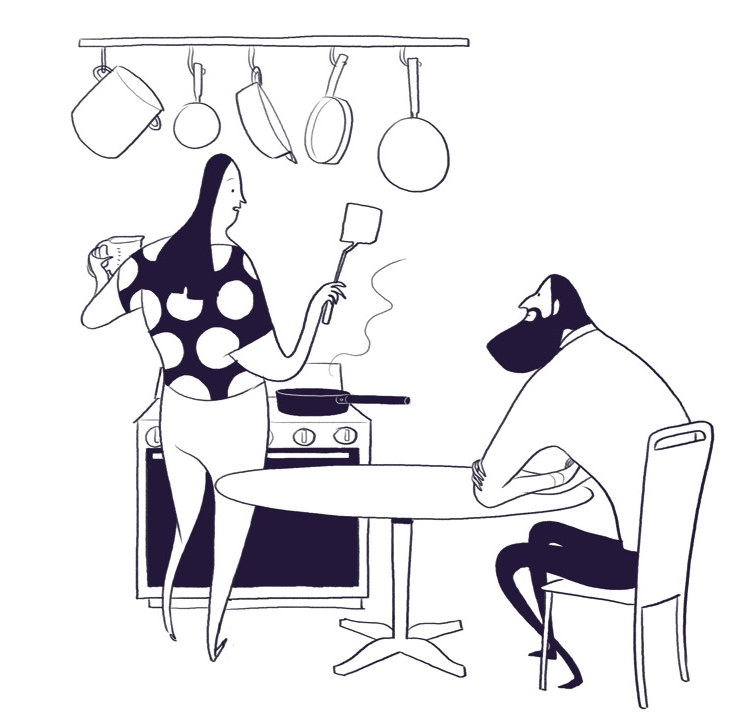Do You Mind If I Give You a Bit of Advice? Making Sense of “Peer Wisdom”

There’s an endless supply of “peer wisdom” out there. That’s a term I use for all the advice that bubbles up around you. It can come from friends, family, and sometimes even from complete strangers.
*This post originally appeared on our Member Site blog, where experts respond to members’ questions and concerns. To take advantage of our current special offer and get full access to the Allies in Recovery eLearning program for families, click here.
Illustration © Eleanor Davis
“Oh, Your Loved One is Addicted? Here’s What You Should Do!”
Having a loved one who struggles with addiction is one of the best ways to attract advice from all directions. Sometimes it feels warm and comforting – just what you need. At other times, you are fighting a desire to clap your hands over your ears. And there can also be times when you just can’t help it: you make a cutting remark to put the person “back in their place.”
Is there a way to make sense of all this advice? Is there a way to put an end to people sharing their two cents when you didn’t ask them to in the first place? How do you know who to listen to?
First, let me say that there’s no remedy that will wipe out all advice-giving from your life. And a lot of advice can actually be helpful. Below, I share some thoughts in the hopes of shedding some light on the subject.
Making Sense of the Advice You Receive
-
Watch out for the “Hopeless” crowd
I have noticed something about the people who are most likely to share their stories – or “wisdom.” They tend to be the people who have had the least success in helping their loved one. Their ongoing frustration may mean they have a strong need to share. If the tone of what the person is sharing tends toward the negative, and sounds hopeless, beware! Scientific research has shown that there are many positive changes family members can make to improve their situation. My experience working with families backs this up.
-
If it sounds awful, it may well be
Many people are still clinging to some common and popular beliefs about dealing with addiction. The notions of “detaching” from your loved one or letting them “hit rock bottom” have gotten a lot of lip service. But we now know that these are not the best solutions. Studies on CRAFT have shown that families can step in before things get out of hand. There is actually a lot you can do to help. Work on your own ways of communicating. Learn to adapt your own behavior depending on if they are using or not using. Every word or gesture can make a difference.
-
Sound advice to family members should meet the following 3 requirements, it should:
- show respect for the loved one.
- reflect the reality that as a family member you can not control the situation but you CAN influence it.
- focus on what is happening now, in the present moment (and not, for example, harping on things that happened in the past)
-
At Allies in Recovery, we do not seek to dispense instructions on how to deal with each situation you encounter.
Instead, we hope to help you get a handle on a framework for affecting change in your relationship with your loved one. The principles that make up the CRAFT method are suggestions – not prescriptions. Our goals are:
- making you feel better,
- improving your relationship with your loved one, and
- helping you help them to get help.
Get CRAFT. Get a Precious Tool-kit.
As you become better acquainted with the CRAFT method for moving your loved one towards treatment, you’ll probably notice that much of what we teach forms a precious tool-kit. It is not only helpful for families dealing with addiction. Anyone who wants to end gridlock and move towards positive change in their life can use these tools with great success.
As a final note, let me remind you that as lost as you may feel at times, you also have your own, innate wisdom. That little voice, if you can find the quiet you need to hear it, can be an unfailing guide, helping you to act from your heart.
* A membership at Allies in Recovery brings you into contact with experts in the fields of recovery and treatment for drug and alcohol issues. Our learning platform introduces you to CRAFT and guides you through the best techniques for unblocking the situation. Together we will move your loved one towards recovery.
